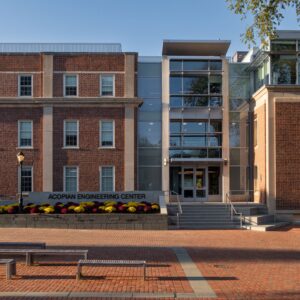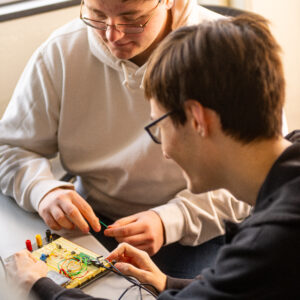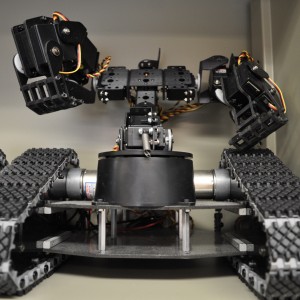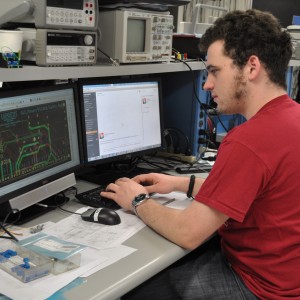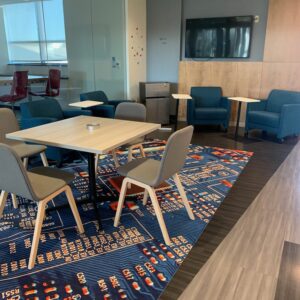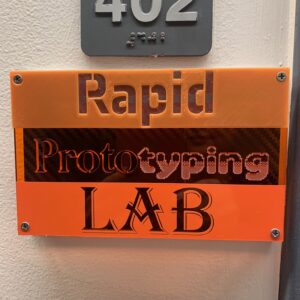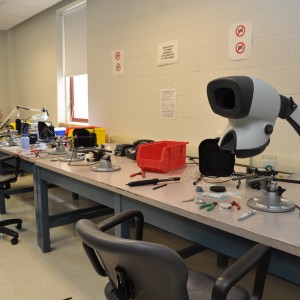Facilities
The Electrical and Computer Engineering Department supports instruction and research using state-of-the-art facilities. Instructional labs are available for student use at all times that a scheduled lab is not in session, including evenings and weekends.
Digital Circuits & Computer Systems Laboratory (AEC 419)
The Digital Circuits & Computer Systems Laboratory is used for required courses in digital circuits and an elective in embedded systems. Digital logic design, microprocessor-based digital systems, Verilog HDL, C programming, and embedded systems are taught in this laboratory. Laboratory equipment includes: dual-boot Linux/Windows PCs; mixed signal oscilloscopes; power supplies; function generators, Digilent Nexsys4 FPGA Boards, and Microchip PIC32 microcontroller boards. In the laboratory, students work in teams of two at six workstations. Digital Design I culminates in the design of a pulse monitor circuit that determines a person’s pulse using infrared light; Digital Design II includes projects to build a hardware controller for a scrolling LED-matrix sign, program a microcontroller to control a line-following robot, and create multiple hardware implementations of a reduced instruction set processor. In Embedded Systems students build advanced hardware/software systems using microcontrollers and peripherals. Labs include creating a digital capacitance meter, a direct digital synthesis audio generator to support a “Name That Tune”-style game, and a virtual whack-a-mole game on a touch screen. The course culminates with final projects of students’ choosing. Past projects have included a wireless game buzzer system and a musical fingerprint-based doorbell.
Circuits and Control Systems Laboratory (AEC 402)
The Circuits and Control Systems Laboratory is used for the introductory course in electrical circuits (ECE 221), the senior-level Feedback Control Systems course (ECE 433), and the senior-level Digital Signal Processing course (ECE 434). This laboratory includes six PCs running PSpice simulation software (industry standard version). It also includes standard bench-top instruments (scope-multimeter-signal generator-power supply), MATLAB toolboxes, and QUANSER Mechatronics Units. This laboratory supports up to 18 students per section working in teams of two at six workstations. Basic experiments involving linear Electrical Circuits are performed in this laboratory, culminating in active filter applications, phasor analysis, and line-tracking robot design. Control System experiments for this laboratory involve hardware-in-the-loop design and implementation of feedback control algorithms to control mechatronics systems using MATLAB and SIMULINK toolboxes. Students in Digital Signal Processing perform experiments using Texas Instruments DSP boards, MATLAB and MathWorks Software, and a number of Speech and Image processing peripherals.
Electronics Circuits and Systems Laboratory (AEC 410)
The Electronics Circuits and Systems Laboratory is used for two required courses in Electronics, a required Electromagnetics course, advanced electronics electives, and for student project work. Fundamentals of solid-state electronic circuits, concepts of analog integrated circuit design, and modeling of electromagnetic phenomenon are taught in this laboratory. The major computing and software elements include 7 PCs (Spring 2016 purchase), Smartspice (industry standard version) Simulation software, MATLAB and MathCad tools, Silvaco IC and Mentor Graphics PCB layout and schematic capture tools, and Verilog simulation and design tools. The labs for the two course sequence in electronics are primarily hardware labs with simulation for proof of concept. For instruction in electronics, up to 12 students work in teams of two at six workstations which are equipped with digital multi-meters, oscilloscopes, triple output power supplies, and signal generators. The second course in the electronics sequence culminates in an open-ended capstone mixed-signal effort that involves designing a system to a functional specification for a sensing application with rudimentary feedback control. Students provide convincing analysis and appropriate simulation of their proposed system designs, then build and demonstrate their functioning hardware.
Projects Laboratory (AEC 406)
The Projects Laboratory is open to all ECE students, from first-years to seniors. The lab includes four fully outfitted workstations for through-hole and surface-mount electronics assembly and rework. Along with a full complement of hand tools, each bench includes a temperature controlled soldering station, fume extractor, and lead-free solder with safe, no-clean flux.
This lab also features a Vision Engineering Mantis Elite ergonomic 3D inspection microscope, offering superior optical performance compared to more traditional stereo microscopes. Students use the resources in this lab to gain hands-on experience developing board-level electronics using the latest components. Fabrication skills honed in this lab are exercised with hardware projects in introductory and intermediate ECE courses. These experiences inform student design and research work in advanced courses and independent projects.
Biomedical Research Laboratory (AEC 423)
The biomedical research laboratory, led by Prof. Yih-Choung Yu, focuses on the applications of controls and signal processing in bioengineering. Major instruments in the lab include:
- Biosignal acquisition system (g.HIamp, g.tec Medical Engineering GMBH, Austria)
- Dynamic signal analyzer (0 – 102.4 kHz)
- Fastcam X1280 Image Acquisition System
- Transonic flow meters
- Data acquisition systems (Quanser Q8)
- Digital Bridge Amplifier and pressure transducers
Research projects conducted in the laboratory in recent years include: modeling of the cardiovascular system, development of ventricular assist device, feedback control of a ultrasound scanning probe, and brain-computer interfaces for robotic device navigation.
